Bobby Steggert, Fred Weller, Grayson Taylor & Tyne Daly in "Mothers and Sons". Photo credit: Joan Marcus.
The message that remains at the core of most of playwright Terrence McNally's work is that people must continue to change and evolve so that society may survive. At 75, he remains ebullient and optimistic, and his newest play to open on Broadway this spring, Mothers and Sons, while not earnest, will leave audiences feeling hope for the future. It centers around the story of happily married gay dads (Fred Weller and Bobby Steggert) who are confronted by the angry mother (Tyne Daly) of a dead lover as she continues to struggle for forgiveness and redemption. McNally says he wanted to write about this "new world we live in" after a stage revival of his Emmy-winning 1990 teleplay, Andre's Mother was proposed and he realized how radically the world had changed within his lifetime.
 "I couldn't have written this play 20 years ago," McNally says, who many still associate with his AIDS-related plays of the '80s and '90s, such as Love! Valour! Compassion! "Being legally married gives us an equality that requires us to take our full place in the world. It's enormous, these changes of how gay relationships have been viewed for hundreds and hundreds of years. The real impact hasn't really sunk into the national consciousness yet."
"I couldn't have written this play 20 years ago," McNally says, who many still associate with his AIDS-related plays of the '80s and '90s, such as Love! Valour! Compassion! "Being legally married gives us an equality that requires us to take our full place in the world. It's enormous, these changes of how gay relationships have been viewed for hundreds and hundreds of years. The real impact hasn't really sunk into the national consciousness yet."
We asked him more about working with Tyne Daly, writing this part for out actor Bobby Steggert, and what marriage equality means to him--especially since he got legally wed as well.
So does it matter if we don't know the play Andre's Mother? Have never seen it?
It doesn't matter at all. This is in no way a sequel to Andre's Mother. Jed [Bernstein] asked me if he could do it with Tyne [at Bucks County Playhouse]. Sure, she's a great actress, and they were going to do the teleplay. In the original, she doesn't speak, however, she's silent; it's a monologue for another character. So it's hard to say who she was.
I re-read it and so much has happened in the past 25 years, certainly over the last 20. So this is in no way a sequel. It's a new play; it's a 25 years later continuation. I can't deny that I wrote a play 25 years ago called Andre's Mother. But this is definitely a new play by Terence McNally
Tell me about the title. It made me recall D.H. Lawrence's Sons and Lovers. What is it about mothers and sons that is so powerful?
It seemed to be the right title for it. I was aware of the other one [by Lawrence], but this sounds more primordial, about the basic need men have for their mothers. Cal [played by Fred Weller], he never had a mother, and he wanted Katharine [played by Daly] to hold him that day of his lover's funeral. She's a mother, and she can't help but blame this guy for taking her son Andre from her. If her [dead] son hadn't met Cal, she thinks he would have been straight.

Bobby Steggert (left) and Frederick Weller play husbands and fathers in 'Mothers and Sons'
I interviewed Bobby Steggert last year, the day after he finished playing Will in the premiere production of this play in Bucks County. He said you wrote it with him in mind?
Yes, I wanted to write a role for Bobby. He was an actor that I saw no more than five or six years ago at a little theater in Brooklyn. Then he was cast in a revival of Ragtime, and I very much wanted to write a part for him. It's one thing to want to write for them, and then you hope they want to do it.
He wrote an elegant piece about coming out, a really important piece.
Yes, I know, he wrote it after the story we did in Out.
I certainly didn't know he could write so well and articulate; it's great. I think he's a wonderful actor. He's cute, but also a special young man, very thoughtful and very, very bright.
You're known for writing moving narratives that focused on the destruction of AIDS on friends and families. How have things changed since those days? There seems to be more optimism in this play.
AIDS certainly transformed the lives of all Americans but especially gay men and women. Life keeps evolving. We have to change. Life deals us some really bad things, such as AIDS. That's one thing that's great about the way we live our lives. The little boy in the play, too. We see that the world is going to go on without us. You, me, this cast. People, thousand years from now, they will have evolved into a whole other order.
Are you surprised by all the things that happened last year and continue to happen for marriage equality?
My play Some Men, it was reviewed as a "what if" play. "What if" men will be able to be married one day. And Some Men isn't even 10 years old. Marriage equality was defeated so roundly in Albany that year, I thought, Gee, I better write about it. But, no, I'm not surprised, I'm happy that there's been such incredible change in our lives, for all of us. Specifically mine as a gay man.
When I came to New York, I went to Columbia at 17, and if you were gay, you kept it to yourself. There were other gay students, but most of the gay men I knew about were living down in the Village. You'd go down these dark little streets. I went three or four times--we are such a long way from those dark dangerous days. It's hard to believe.
But the Supreme Court decision, it's still just a few months old. The real impact hasn't really sunk into the national consciousness yet. There have been enormous changes about how people thought and viewed gay relationships for hundreds and hundreds of years. It's not going to change overnight.
I wonder, is this play a revenge play or ultimately about forgiveness?
Katharine does want revenge, as she says at one point in the play. But I think it's about forgiveness and trying to understand. I wanted to know what makes a Katharine a Katharine. It's about generations and family. It was more challenging for me to write a character like Will than like Cal or Katharine.
There are four generations in this play, and the youngest, he accepts her right away. He hasn't been taught, as the son of two gay men, you're not supposed to like people like that. I do think there's healing and forgiveness in this play. I think it ends on an optimistic note, rather than a bitter one. No, it's not a conventional happy ending, that they're all going to live together. I can't imagine that there's not at least one character that someone is going to identify.
I know you got married, so you basically think the marriage equality fight is the most important thing at the moment?
When you're married, that gives you an equality; you really have to take your full place in the world and in our own communities. You can't hide out anymore. Before we thought, We're gay and we don't have to be interested in who's going to be school superintendent. And now, there's no excuse not to be in the middle of tall these fights. It's leveled the playing field, this marriage right, I think. Much more than anything else has. It's really significant. Of course homophobia still exists. We still have racism. But there's no legislation that significantly denies the rights of people with color.
But there's certainly racism. I grew up in a South with separate drinking fountains. So much has changed in the 75 years that I've been conscious. It's all wonderful, these changes.
Mothers and Sons is currently playing on Broadway.
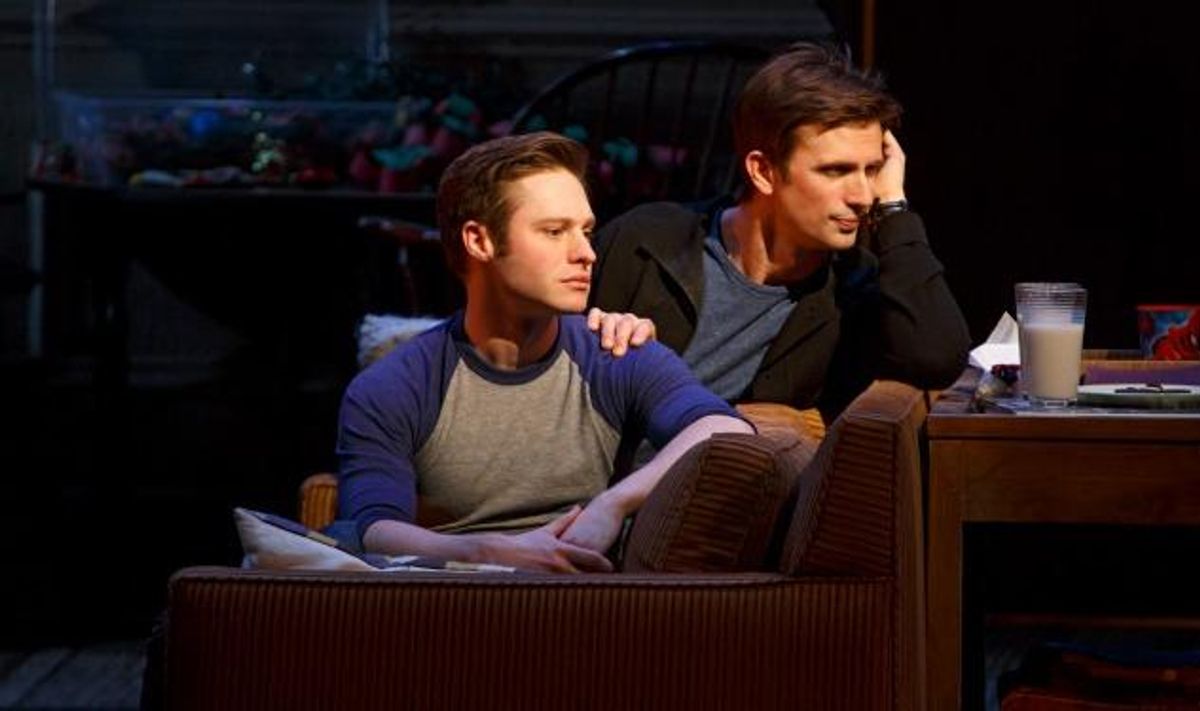



 "I couldn't have written this play 20 years ago," McNally says, who many still associate with his AIDS-related plays of the '80s and '90s, such as
"I couldn't have written this play 20 years ago," McNally says, who many still associate with his AIDS-related plays of the '80s and '90s, such as 















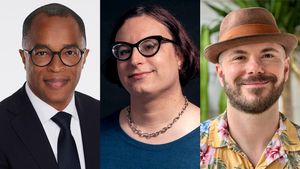




















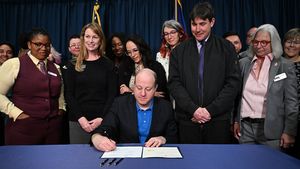









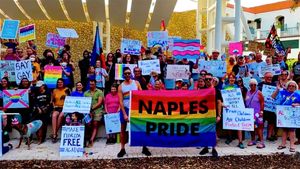




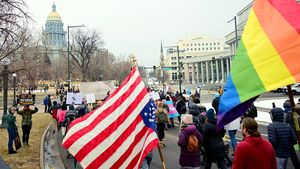

































Cooper Koch and twin bro spark controversy with eye-popping 'White Lotus' parody